Redditor Furious Because Grandparents' Puppy Goes After Their Old Cats And Her Mom Thinks It Is Hilarious
Introducing a puppy into a home with several old cats can present numerous challenges. Namely, puppies are usually full of energy and may have difficulty adjusting to the slower pace of older cats.
This can lead to conflicts and may cause the cats to feel stressed or threatened. Another problem is that puppies may have a rougher play style than older cats, which can lead to accidental injuries or conflicts.
One Redditor shared a story that perfectly illustrates this problem. They ask: "AITA for telling my mom not to spoil my grandparents' dog?"
They live with their mom in a small house behind their grandparents' house. Even though the grandparents are unable to take care of themselves, they got a dog.
The dog spends a lot of time at OP's house, where their mom is "spoiling it rotten." OP owns three old, calm cats, and the puppy wants to play with them.
OP tries to punish the puppy whenever it goes after the cats, but their mom is against it and criticizes them. OP constantly tells their mom that the dog needs to be trained, but she doesn't care.
The cats seem to be scared of the dog, and OP is angry at her mom for thinking it is hilarious. Read the full story below:
OP asks:

They live with their mom in a small house behind their grandparents' house. Even though the grandparents are unable to take care of themselves, they got a dog.
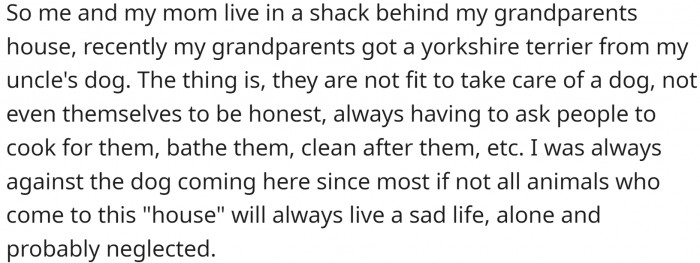
The dog spends a lot of time at OP's house, where their mom is "spoiling it rotten."

Understanding Animal Behavior in Multi-Pet Households
This situation illustrates the complexities of managing multiple pets, especially when introducing a new puppy to older cats. Research in animal behavior highlights that the introduction of new pets can lead to stress and territorial disputes among existing animals.
Understanding the dynamics between different species is crucial for ensuring a harmonious household.
The Impact of Untrained Pets on Family Dynamics
This situation highlights the challenges of integrating a new puppy into a household with existing pets. Dr. Carol Simmons, an animal behavior specialist, notes that untrained puppies can disrupt the established dynamics within a household, particularly with older pets. Research published in the Journal of Applied Animal Welfare Science indicates that the integration process requires careful management to prevent stress and conflict.
When new animals join a household, they often need time to acclimate, and existing pets may react negatively if they feel their territory is threatened. This underscores the need for gradual introductions and proper training to ensure harmony.
OP owns three old, calm cats, and the puppy wants to play with them.
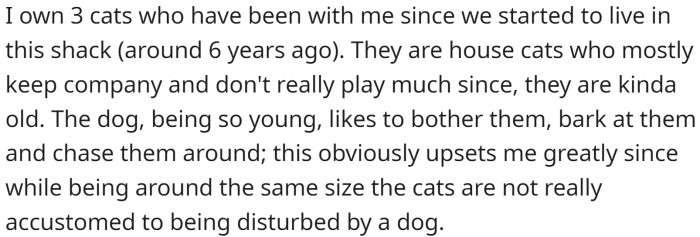
OP tries to punish the puppy whenever it goes after the cats, but their mom is against it and criticizes them.

OP is constantly telling their mom that the dog needs to be trained, but she doesn't care.

According to Dr. Ramani Durvasula, a clinical psychologist, "Older cats may display defensive behaviors when confronted with a new, energetic puppy, which can often be misinterpreted as playfulness by their owners." She emphasizes the importance of recognizing these signs to prevent potential conflicts. Understanding these dynamics is crucial, as Dr. Durvasula notes, "Failing to acknowledge a cat's discomfort can lead to aggression or avoidance, which might escalate into serious situations." For more insights, visit her professional website at drramani.com.
Moreover, the emotional well-being of older pets must be considered during this process. According to studies in veterinary psychology, older pets may experience stress when new animals are introduced without proper training. A study published in the Journal of Veterinary Behavior suggests that older animals may display signs of anxiety or aggression if they feel challenged by a newcomer.
Providing structured interactions and training for both the puppy and older pets can alleviate these tensions. It’s essential to create a safe space for older pets where they can retreat and feel secure during the adjustment period.
The cats seem to be scared of the dog, and OP is angry at her mom for thinking it is hilarious.

OP has offered the following explanation for why they think they might be the asshole:

"Puppy or not, that dog can hurt your cats"
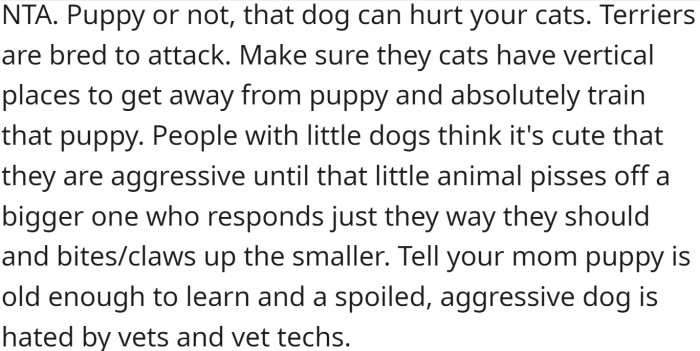
The Importance of Gradual Introductions
Gradual introductions are key to successfully integrating new pets into a household. Research in animal behavior suggests that allowing pets to acclimate to one another's presence at their own pace can significantly reduce stress and conflict.
Providing separate spaces initially can help each pet feel secure while they adjust to the changes.
The Importance of Training and Socialization
Training is essential for ensuring a harmonious household, especially when integrating a new puppy. Research indicates that early training can significantly impact a dog's behavior later in life. According to Dr. Harvey Karp, a pediatrician and child development expert, "Early training not only helps in shaping a puppy's behavior but also fosters a positive relationship with other pets." Well-trained dogs are less likely to exhibit problematic behaviors, which can lead to smoother interactions with other animals.
Implementing a consistent training regimen for the puppy can also establish boundaries and expectations, making it easier for older pets to adapt. This might involve basic commands and socialization with other animals under controlled conditions, as emphasized by Dr. Lawrence Cohen, a child psychologist who states, "Clear communication and socialization are key components in helping pets coexist peacefully."
This Redditor has a different opinion:

Someone has to train that dog, and neither mom nor the grandparents are able or willing to train it.
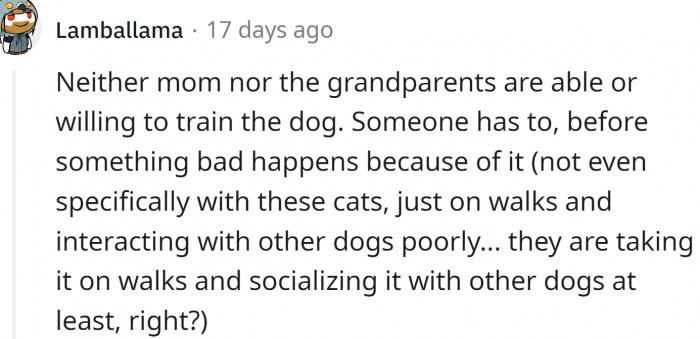
It is her grandparents' dog.
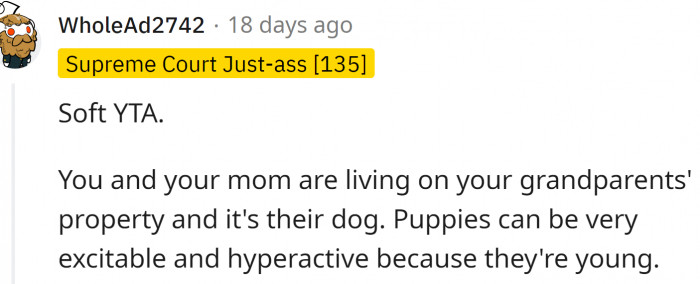
One practical approach is to utilize baby gates or crates to create safe zones for each pet. This allows for supervised interactions without overwhelming any animal.
Gradually increasing the time they spend together can help build positive associations and reduce anxiety.
Additionally, it’s important to foster positive interactions between the puppy and older pets. Research in animal behavior suggests that positive reinforcement can be effective in promoting friendly interactions. According to studies in the Journal of Animal Behavior, rewarding both the puppy and older pets for calm and friendly interactions can help build positive associations.
This approach not only helps the puppy learn proper behavior but also reinforces positive dynamics within the household, ultimately fostering a more peaceful coexistence for all pets.
Punishing the dog is not a great idea.

"The dog needs training, and cats are perfectly suited to do some of that training."
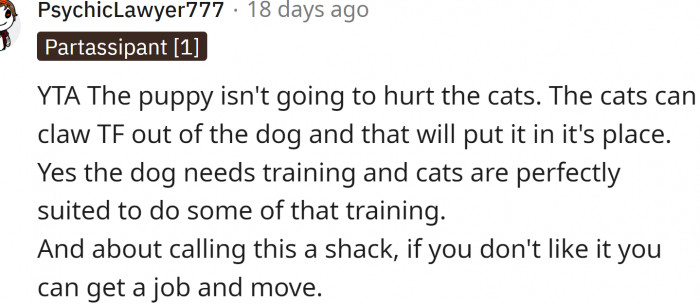
OP replied:

Recognizing Stress Signals in Pets
Being aware of stress signals in pets is essential for preventing conflicts. Research in veterinary behavior stresses the importance of recognizing signs of anxiety, such as hiding, hissing, or aggressive posturing.
These signals can indicate that a pet is feeling overwhelmed and needs space to decompress.
To address these challenges, it is important to take the time to introduce the puppy to the cats properly and to establish boundaries and rules for the animals to follow.
This may involve using separate feeding areas, providing plenty of hiding spots and places for the cats to retreat to, and supervising interactions between the animals to ensure that they are behaving appropriately.
It is also important to give the cats plenty of attention and affection to help them feel more comfortable with the new addition to the household.
Psychological Analysis
This situation illustrates the challenges of introducing a new puppy into a home with older pets. It's crucial to manage these dynamics through proper training and gradual introductions to ensure the well-being of all animals involved. Positive reinforcement can be a powerful tool in fostering harmony.
Analysis generated by AI
Analysis & Alternative Approaches
Integrating a new puppy into a household with older pets requires careful planning and training. By prioritizing training and positive socialization, pet owners can create a harmonious environment for all animals involved.
Recognizing the emotional needs of both the new puppy and existing pets can lead to healthier interactions and a more peaceful home.
Owners should monitor their pets' interactions closely and intervene if signs of stress appear. Providing safe spaces for retreat can help pets manage their anxiety levels and create a more peaceful household.
Building a safe environment allows pets to feel secure and reduces the likelihood of aggressive behaviors.
The Role of Owner Involvement in Pet Behavior
Owner involvement plays a crucial role in shaping pet behavior and interactions. Research in animal psychology indicates that a pet's behavior can be significantly influenced by the owner's responses to their actions.
Being proactive and informed can help owners guide their pets' behavior in positive directions.
Engaging in training and socialization activities can enhance the bond between pets and their owners while promoting better behavior. This not only benefits the individual pets but also contributes to a more harmonious environment overall.
Creating routines that incorporate positive reinforcement can lead to improved behavior in both new and existing pets.
Analysis & Alternative Approaches
Successfully integrating a new puppy into a household with older pets requires careful consideration of animal behavior and dynamics. Research underscores the importance of gradual introductions, stress recognition, and owner involvement in promoting harmony.
By applying these strategies, pet owners can create a more peaceful living environment for all their animals.



